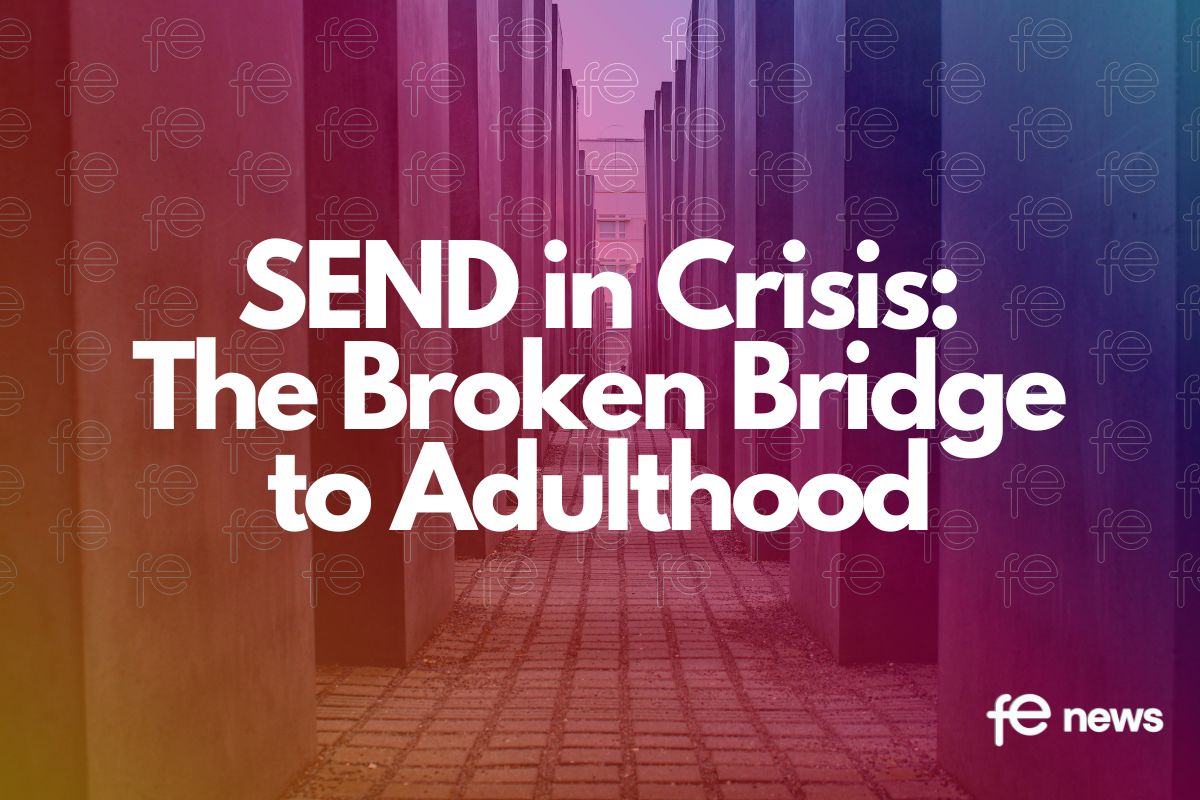SEND in Crisis: The Broken Bridge to Adulthood

- The transition from children’s to adult services creates a dangerous “cliff edge” in support, particularly in mental health services
- There is a critical shortage of specialist residential and supported living accommodation across England
- Support quality varies significantly between those with and without Education, Health and Care (EHC) plans
Overview
This report examines how effectively local areas in England support young people with special educational needs and/or disabilities (SEND) in their transition to adulthood. The review, conducted through visits to six local area partnerships, identifies strengths and significant challenges in the system.
Key Findings
Employment
Career education and guidance were more effective in specialist settings than in mainstream schools. Local areas face a persistent shortage of suitable post-16 and post-19 employment opportunities. While supported internships show positive results, they face significant accessibility barriers. A common challenge across regions is finding enough employers to accommodate SEND needs and provide appropriate support.
Independent Living
The research shows that early focus on independence skills leads to positive long-term impacts. However, there is a critical shortage of specialist residential and supported living accommodation across all areas. Children in care with SEND generally receive better transition support than their peers, benefiting from more coordinated services. The effectiveness of multi-agency cooperation varies significantly between areas, with some showing strong collaboration while others struggle with coordination.
Community Inclusion
Local areas provide various community-based activities but face increasing capacity issues due to rising demand. Rural areas and wheelchair users encounter particular accessibility challenges that limit their participation. Family hubs and children’s centres provide valuable support services, though their availability varies by region. A persistent issue is inadequate communication about available family services, leading to underutilising existing resources.
Health Services
The transition from children’s to adult health services presents significant challenges, with many young people facing a “cliff edge” in support at age 18. Areas implementing all-age health pathways show better results than those with segregated services. Mental health service transitions are particularly problematic, with many young people experiencing gaps in care during crucial periods.
Major Challenges
The system faces several fundamental challenges. There is insufficient specialist accommodation to meet current needs. Workforce recruitment and retention issues persist across all sectors. Transition planning lacks coordination between different services and agencies. Post-16 opportunities remain limited in many areas. Communication between services is often poor, and support for those without Education, Health and Care (EHC) plans is inconsistent.
Recommendations
The report outlines specific recommendations for various government departments and organisations. The Department for Education should develop a national EHC plan template to standardise transition planning. The Department of Health and Social Care needs to strengthen transition guidance for health services. NHS England should ensure timely formal diagnoses to enable better planning. Local authorities must improve their preparation for adulthood reviews, and schools and colleges should enhance their career guidance for SEND students.
Conclusion
While some local areas are progressing in supporting SEND transitions to adulthood, significant systemic issues remain unresolved. The report emphasises the urgent need for better coordination between services, improved resource allocation, and consistent support across all areas. Particular attention must be directed toward addressing the “cliff edge” in health support and ensuring smoother transitions between children’s and adult services. Success in these areas will require sustained stakeholder commitment and systematic implementation of the report’s recommendations.
Sector Reaction
David Holloway, Senior Policy Manager – SEND, Association of Colleges, said:
“Today’s report from Ofsted and the Care Quality Commission on preparation for adulthood arrangements for young people with SEND reveals in stark terms what colleges have long known: that students’ transitions into college and towards adulthood are hampered by a whole range of problems. There is a lack of specialist support from health provision for college students, education health and care plans (EHCPs) are too often not focussed on preparation for adulthood, and transition can be even more difficult for students without EHCPs.
“Colleges do wonderful work helping students of all abilities develop skills for adulthood, whether that’s preparing them for employment or independent living. However, what needs to change is the way that different agencies in the wider SEND system fit together to support students with SEND along the entirety of their journey in education.”
Responding to a new Ofsted and Care Quality Commission report highlighting how longstanding weaknesses across the SEND system are impacting young people’s transition to adulthood, Rob Williams, senior policy advisor at school leaders’ union NAHT, said:
“School leaders, including those in residential special schools, have for years been calling out weaknesses in the system when it comes to helping young people with special educational needs transition to adulthood.
“This report highlights how an unacceptable postcode lottery and a lack of capacity in health and social care services to offer early help mean parents increasingly see securing an Education Health Care Plan (EHCP) as crucial to at least give their child a chance of receiving the right support.
“Schools already provide invaluable information about children’s needs, but this could be better used if transition planning began earlier and services engaged more consistently in effective collaboration.
“The previous government failed to commit enough funding or focus on preparing children with additional needs for adulthood or on the SEND system more broadly. It’s vital the new administration invests in building the capacity of specialist services and schools and colleges to offer children timely support which is maintained throughout their education and post-18 to help boost their life chances.”











Responses